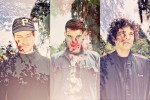Every year, new artists emerge, ready to be Los Angeles’ next great musical discovery, making their rounds through small club tours across the city. Inspired by the hippie enclaves of Topanga, the backyard punk scene of East Los Angeles or the coastal grunge of Venice Beach, each act has its own distinct sound. This week, A&E columnist Kristy Pirone discusses White Arrows, a “psychotropical” Los Angeles quintet.
The use of genre labeling has gotten out of control.
People want to know what they’ll be listening to before they hear it, clearly and quickly through labels like pop or rock. Everyone from bloggers to listeners to artists themselves have fallen into the trap of relying too heavily on genres to define music, even though music isn’t something that can be easily categorized.
Most music defies categorization because influences run the gamut and artists can easily jump from one genre to another in their careers, their albums or even their songs. But because of the societal need to classify, artists struggle to fit themselves into genres, often by overcomplicating their genres to the point where they barely sound like the genre they’ve subscribed to.
Take Los Angeles-based band White Arrows. Although its Facebook page cites the band as “psychedelic, electronic, pop,” while the term “psychotropical” has been used online by fans, reporters and the band itself as the definitive genre for the Los Angeles quintet, who will perform Friday at the Roxy Theatre in West Hollywood.
Listening to its music, I can understand the tropical aspect of the band’s psychotropical label. Lead singer Mickey Church grew up partially blind in Los Angeles before having his vision righted at age 11. The band’s sound is heavily influenced by the colors, smells and sounds of the West Coast that Church knew during these early years of his life, when the city was just an “impressionistic smear” to him because of his poor eyesight.
Lyrics from songs like “Little Birds” off the band’s 2012 debut album “Dry Land is Not a Myth” show the breezy, tropical feeling that is associated with the idea of the psychotropical genre: “Now you’re going / Meet all your friends / Beneath the ocean.” Listening to “Dry Land is Not a Myth” conjures images of quintessential parts of growing up in Los Angeles like the beach, music festivals and lazy days by the pool.
Still, the “psycho” aspect of White Arrows’ psychotropical genre remains a mystery. There’s not much beyond the electronic aspects of its music to imply that it’s trying to be psychedelic, which is what I’m assuming the psycho label is referring to. Part of me almost wonders if they actually meant to say “pseudo.”
The band’s music has darkened significantly in its 2014 album “In Bardo,” obscuring some of its tropical influences and further confusing its genre identity. The band has also drawn comparisons to “punk, new wave, classical” band Vampire Weekend, and I hear traces of “rock/healing and easylistening/soul” duo MGMT in White Arrows’ sound.
The comparison to Vampire Weekend undoubtedly comes from Church’s Ezra Koenig-esque vocals, adding an element of indie rock to White Arrows’ soaring, mellow sound. As for MGMT, the chanted refrains of “We won’t ever change / We can’t ever die” in White Arrows’ “We Can’t Ever Die” and the electronic elements to its music are reminiscent of the duo’s first – and best – album “Oracular Spectacular.”
Putting aside the fact that no one I know would call Vampire Weekend a punk band and that I can’t seem to think of how MGMT’s music could be called “healing,” the wide range of genres associated with White Arrows’ predecessors show how genres aren’t especially useful in predicting an artist’s sound.
It seems like all genres do are serve as tools used to stifle the creativity and potential of musicians. Genres affect the listeners’ perceptions of bands by associating artists’ music with generally understood ideas of what is expected from an “indie band,” a “rapper,” an “electronic artist” or whatever it is they’re considered to be. Then, those artists are supposed to live up to these skewed expectations.
This leads to overly-specific genres that attempt to expand the expectations of what a band should be doing, but only succeed in making bands sound more pretentious than they actually are.
While I can see how genres are a necessary evil when it comes to, say, being able to browse the iTunes store for new music, these labels are taken too seriously by listeners and those in the music industry. Just look at the preoccupation the public had with deciding whether or not Taylor Swift could be considered a country artist.
Like Swift, White Arrows’ music is enjoyable regardless of what it’s called. And whether its tracks sound more like a pop group or an indie band, it is up to each listener to decide for themselves, not some arbitrary label.
